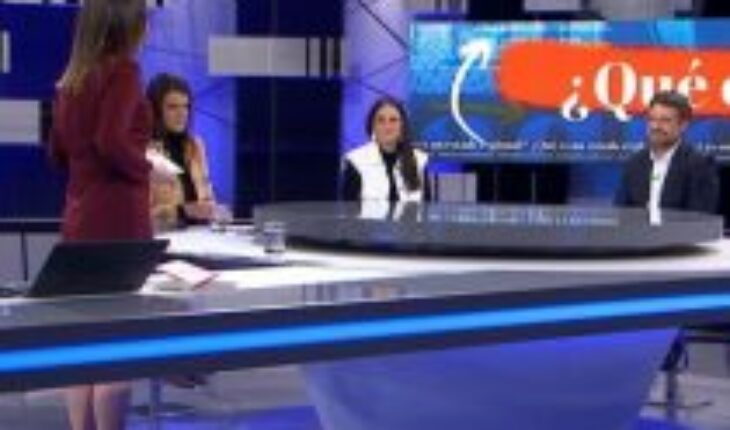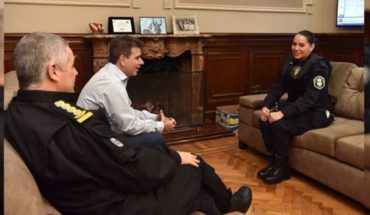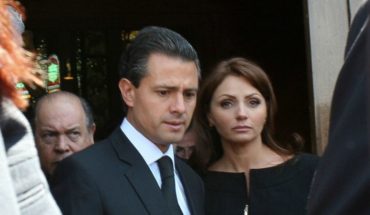It was on the night of June 16, while watching the sixth chapter of “Constitutional Radiography”, a political conversation program of Channel 13, that criminal lawyer Mauricio Salinas heard a criticism of a norm already inscribed in the draft that startled him. “I’m not very good at watching television, but I was interested in watching this program because it brought together the constituent issue with public security,” says the secretary of the Citizenship and Justice Corporation and member of the Constituent Civic Observatory.
That the chapter has referred to crime made it attractive, since this matter – says the lawyer – is not only at the top of the concerns of citizens, but also tends to inspire – he assures with some resignation – the most irresponsible and demagogic behaviors in politicians, and this in view of the high dramatic burden that the pain of the victims implies.
His surprise was enormous when he heard Sebastián Soto, a constitutional lawyer invited to the program, argue that the aforementioned rule already present in the draft allowed inmates serving an afflictive sentence for serious crimes, such as homicides, to run for positions of popular representation, an aspiration that the inmate could fulfill even while behind bars.
Salinas admits that he found the image of an inmate directing his campaign command from a prison gallery to be feverish. He soon went to review the draft to review the article, one that, according to his experience, had gone little less than unnoticed before his eyes because it did not involve anything very unique or far-fetched. And he read: “Persons convicted of crimes against humanity, sexual crimes and domestic violence, those linked to corruption such as tax fraud, money laundering, bribery, bribery, embezzlement of public funds and others established by law will not be eligible for public office or popular election. The terms and terms of these disabilities shall be determined by law.”
The extract “and the others so established by law” referred him to article 28 of the Criminal Code, which establishes that afflictive sentences greater than 5 years and one day (and this includes penalties such as imprisonment, imprisonment, confinement, estrangement and relegation) “carry with them the one of perpetual absolute disqualification for public offices and offices and political rights and that of absolute disqualification for titular professions while it lasts. the condemnation.” The article has remained unchanged since 1874.
Everything was clear, in his opinion. Surely it was a mistake, because, in the long run, “everyone is wrong,” he adds. But the bewilderment, far from leaving, increased when, minutes later, he listened to the conventional Felipe Harboe, also a lawyer and also former Undersecretary of the Interior (and senator, for more signs), assuring that the Convention had eliminated “the inability to be a candidate or public official to someone convicted of terrorism.”
“I had already seen ‘Sin Filtro’ and it seemed to me a horrible space, a space unsuitable for discussion and the exchange of ideas of a certain level. But I go over to watch this show and then I realize that even these shows that are presented as serious have become platforms for issuing false information, and no one says anything! Because it’s one thing to have a different opinion about a certain fact and another to lie. And of course: the different opinion may be legitimate, but the lie never is,” says Salinas.
“And here we have again in this channel, but in all channels, people sowing lies and confusion. Unfortunately, in the face of the constituent process, the media in Chile have behaved as what they are: an apparatus of ideological reproduction,” he adds.
The event caused a stir among the most informed observers of the constituent process and experts in the field. The debate was immediately ignited on social networks, through clarifications by other conventionalists, some constitutionalists and several reputed criminalists of the square eager to bring clarity on the point, among them, the prosecutor Carlos Gajardo, who braided in a discussion with the conventional Manuel José Ossandón, the son of the homonymous senator of RN. So far, Salinas is still waiting for the program to open up to clarification or an alternative opinion. Because that is the other imbalance, according to the academic: the representation of the Rejection on the television set was much higher than that of the Approve, which counted. only with Janis Meneses, from Movimientos Sociales Constituyentes. In fact, in defense of the rejection of the constitutional proposal option were Ruggero Cozzi (RN) and Pablo Toloza (UDI). Felipe Harboe, despite being introduced as a center-left panelist, was a relentless critic of security proposals throughout the program.
“So, with this type of performance it is clear that in the channel there is an editorial commitment to rejection, nothing strange if we consider that someone like Mr. (Andronic) Luksic, the owner, must be more committed to the status quo than to changes. Then again it is clear that this privileged sector, the one that benefits from the illegitimate inequalities that Chilean society suffers, will not skimp on raising lies and doing everything in its power to avoid what terrifies them most: losing power, “he adds. “In imperfect democracies, elites specialize in lying and distraction. Without these weapons, they would have no way to win elections,” he said.
So far we have seen a cascade of false claims fall: that pension funds will be expropriated, that only the State will be able to provide education, that subsidized schools will disappear… The lawyer and political scientist Jorge “Pirincho” Navarrete brings up one that “has penetrated strongly in a sector of the citizenry”. Its most enthusiastic promoter, through networks and traditional media, is Senator Felipe Kast (Evópoli), who a few hours before gave an interview on the radio of Channel 13 on such a point.
“It has to do with this statement that the current proposal allows a woman to have an abortion up to a few minutes before giving birth. Therefore, what this Constitution would facilitate is abortion at seven, eight or nine months, and that is untenable with respect to the treatment of abortion laws in all parts of the world, where they also have similar constitutional norms, “he says.
But the lies do not end there: that a company gave up on investing 60 billion dollars in a green hydrogen project because of the uncertainty introduced by the constitutional proposal. “It has also been said that there will be no more private health, that the right to property will end, that indigenous peoples will have veto power over any bill or reform…” The list is long, as listed by the conventional Christian Viera himself, while exercising a memory that insists on delivering new examples: “Here the idea that equality before the law ends has been installed with some success,” he says, in relation to justice systems for indigenous peoples, one of the proposals that faces more questions from citizens.
In Navarrete’s opinion, the informative treatment of plurinationality and justice systems seems, in effect, aimed at generating “anger and rage”, while “promoting latent racism with an interested explanation of how these norms are going to be legally deployed”.
Viera, for his part, says he is not unaware of the magnitude of a problem that – as other sources who agreed to talk about the issue maintain – seems widespread in the media system. He himself has seen how these “inaccurate” or rightly false species arise from political programs of all channels, in the mornings or in any conversation space, in which it is possible to see and hear panelists or guests sliding statements that do not conform to the reality of the text. “To correct these falsehoods, one puts the legal argument before the text has the potential to enable a new Chilean model of coexistence,” he says. The problem is that, in Viera’s opinion, from the opposite sidewalk phrases emerge with “attractive ideas that generate public opinion, but it is fallacious information.”
The academic and constitutionalist Domingo Lovera has also witnessed how some groups have been seen in the media with “a declared spirit to misinform or present a certain interpretation of the articles that the Convention has approved, but in which there is no intention to offer a debate or a rational argument, but rather to create fear.”
“The doctrine of fake news requires two parts: the part that enunciates the lie and the part that is willing to believe that lie, and this last part you do not take them out of that lie anymore, regardless of the argument you offer,” says Lovera, who expresses his concern about the tenor of the debate in the media. where “they raise those lies in the mornings, in the news or in the programs when they ask questions, but without further inquiry and without making questions, and that seems regrettable to me,” emphasizes the academic, who has had to act on social networks to orTo revive a discussion contaminated with those falsehoods that already seem to have overflowed the virtual space, that place where lies cultivated with care have demonstrated an enormous capacity to grow and disseminate, to the point of altering electoral processes in countries that enjoy consolidated democratic systems.
By the way: according to the academic, researcher and director of the Department of Supervision and Supervision of the National Television Council, Luis Breull, the media are always responsible for what is broadcast in their spaces, to the point that fake news “are rightly actions that – whether for deliberate reasons or for involuntary negligence – damage the public faith and informed debate. For this reason, it is common in the media to have fact check processes with civil organizations and universities to avoid falling into them, which are serious breaches of the right to information.”
The constitutionalist Tomás Jordán also agrees that the debate in the media has not enjoyed a prolixity commensurate with the historical importance of the process. In fact, declares the academic, “you can visualize that there are people who affirm issues that are not true and are not checked. Only some media have been able to do so or have the will to check to determine if the information is reliable or not, because on television a slogan sells more than the truth.”
The Media Box of Rejection
But this whole affair hints at a deeper problem. “Undoubtedly, the media box of Rejection is excessive from the perspective of the patterns of political representativeness,” says the conventional Christian Viera, concerned about a debate in the traditional media that, in his opinion, has lacked not only all the rigor of argument necessary to guide and properly inform citizens, but it has also failed to strike the necessary balances that make possible the just promotion of one of the positions in dispute, such as that of the Apruebo.
“From the perspective of pluralism, the system is seriously limited, since the breadth of voices in these conglomerates that concentrate the ownership of the media is not favored,” says Viera, about this editorial bias committed to Rejection.
“It is noticeable that there are some media that are not interested in a legitimate political dispute, but more seem interested in bringing waters to a cartoonish interpretation of the constitutional text, in order to generate disaffection or indifference,” he adds.
The president of the National Television Council and National Journalism Award 2007, Faride Zerán, recalls that freedom of expression, the right to truthful and timely communication, as well as respect for principles such as pluralism and diversity, “are the central pillars of a democracy, as well as the right for all voices to attend the public debate and that all are heard.” The above, according to Zerán, “is fundamental and are extremely necessary principles when we face something as unprecedented as a constitutional change, which is the result of the strength of the dialogue that social movements and political parties have promoted in the search for a new social pact.”
And he adds: “However, a part of public opinion sees with impotence that these standards are not always met, and if we add to that a concentrated and rather homogeneous media spectrum in its editorial line; the absence of public media, among other characteristics that tell us about a democracy with a deficit of freedom of expression, while there are voices, speeches and arguments that are not present in the public debate”.
Zerán adds that this problem comes from afar, which makes this picture more complex “and explains this citizen discomfort that perceives that there is no information balance in the face of a process as important as the one we are experiencing.”
Do the media have the right to have an editorial line and position in the face of a process? A robust and healthy democracy confers that right, Viera argues, but ours is not robust or healthy precisely because– argues the jurist and conventionalist – Chile lacks a pluralistic media system that allows that hegemonic editorial opinion, in this case in favor of Rejection, “can be disputed with other editorial options.” The problem is that this concentration of media and its capture by interest groups generates, in Viera’s opinion, a sense of unanimity that “contributes to the generation of stages of public opinion based on misconceptions.”
The Hour of the Bold
The jurists consulted agree that the legal dimension of the discussion can facilitate the spread of lies, since not all people present in a countrynel (except those who follow such a conversation from their homes) have the rudiments necessary to identify those words or minutiae that, at least in a legal text, make all the difference between truth and lie.
“There is a lot of legal ignorance,” says constitutionalist Domingo Lovera, who has observed how this ignorance, in the mouth of people who enjoy certain degrees of influence on public opinion, may be being functional to the narrative of Rejection. In short, he assures that the liars – those who act with intent – are also joined by the “bold”, that is, those who believe they know and speak without complexes, despite lacking foundation and training on these matters.
“Here are many people who, supposedly, are experts or technicians, and they do so by commenting on issues in which they do not have the slightest idea,” adds Lovera. “It is a different level from fake news, because the person misinforms but without the deliberate intention of lying. It does so because they are people who do not have the appropriate knowledge and think about any legal issue, “says the academic and also a columnist, who points to the attraction exerted by cameras and spotlights. “Which I understand, because for many it must be difficult to say no. I do it, because when they ask me about a topic that I don’t handle much, I prefer to subtract,” he says.
In fact, a conventional consulted on this matter justifies her opinions in off so as not to be excluded from a future invitation to a program. Why would you eventually want to participate in a program designed to promote Rejection? His response: “Although the bias of these programs is evident, one cannot subtract from those spaces, to defend one’s position and try to deny the things that are told in those panels.” From Apruebo Dignidad, a source argues that the problem not only has to do with lies and imbalances in conversation programs, but also a design is observed tending to maximize the contradictions of Approval and enhance the “virtues” of Rejection.
“Good panelists, informed panelists, with good handling in front of the camera are reserved for the Rejection, while the Approve is represented by the most maximalist voices. In the end, they call those who can screw up or say something inopportune, or who get tangled up,” says the source of Apruebo Dignidad.
Lovera, meanwhile, urges to differentiate the messages tending to intoxicate the debate from those legitimate interpretative discrepancies, something understandable due to those “very broad rules, very vague and that invite disagreement,” says the academic. “Welcome that disagreement and that discrepancy based on an interpretation of a certain constitutional precept, and this must be distinguished from fake news.” Thus, inaccuracies would not come only from those who lack the truth by a malicious attitude or simple audacity, but also from experts who could be confused with the scope of a norm.
The problem is that, meanwhile, lies circulate “legitimized” by their mention in television programs, the platform that, even today, is the one that most influences certain age groups of the population. What if the statement of the academic Sebastián Soto – in order that people imprisoned for serious crimes could aspire to public office and participate in elections – responded to a simple interpretative difference? Is it possible that your opinion has been modified or at least nuanced as the legal conversation progressed after the program? Salinas argues, however, that the article is so simple that it doesn’t leave much room for “creative” reading.
The academic of the Catholic University was left to transmit his impressions on this point, but due to scheduling problems it was impossible to know them. Should “Constitutional Radiography” establish a fact-checking system to clear the truths of the misrepresentations or inaccuracies that could be issued by panelists and guests? El Mostrador wanted to contact the executive producer, Enrique Mujica, but did not receive a response. The host Mónica Pérez recommended managing an institutional response on Channel 13, but it was impossible to get it, despite the efforts.
Ethical boundaries versus show culture
Jorge Navarrete argues that the importance of the current constituent process, as well as any critical process from the political point of view, “contributes to the discussion with thick strokes, with fake news and information full of inaccuracies.” There are certainly many things at stake, while the very dynamics of the media, inspired by spectacle, conspire against the possibility of holding more restful and thoughtful discussions, he argues. “Immediacy, social networks, contribute little to generate wider spaces for reflection,” he adds.
But is it possible?and objectively determine when a television program meets a minimum standard of pluralism and diversity? Can the National Television Council supervise television stations, considering that they operate thanks to a concession of the radio space, which is the patrimony of all?
Luis Breull, from his role as director of the Department of Oversight and Supervision of the National Television Council, clarifies that it is not the role of this entity to go as a preventive police of content. “It is not up to us to censor a priori, but to review ex post when we receive citizen complaints about it,” explains the researcher. “Ethical standards are not a specific matter of oversight by the Council, but acts that could constitute faults to the proper functioning and that are included in the Television Law. The Council has a mandate to monitor pluralism and around that work is being developed to comply with it, an issue that has been pending since it was included in the last legal reform, “he says immediately.
Despite all the above and the editorial guidelines of each media outlet, there is an element that has contributed to spreading false claims, Viera acknowledges. “Recent and more correct studies establish that one of the reasons for the increase in voting intention for Rejection is the behavior of conventional ones. It would be a mistake to ignore it,” says the constitutional and conventional.
Navarrete agrees, since “the very nature of the process” has contributed to generating false situations, “because we had never designed a Constitution in a democratic way, with parity, with people of the most diverse kinds, with different political opinions and different social positions”, many of which came from outside the walls of politics, thus ignoring the communicational uses, and with little experience before the media. And, as if that were not enough, “with little awareness of the importance of details”, so that “it is perceived that the debate is hasty within the Convention itself”. The constitutionalist Tomás Jordán believes that “the debate between constituents is often confusing and basically they are moments of discussion and contradictory interpretations of the text.” Jordan then challenges those responsible for the media that it is time to “check better what is right and true of what is not” and “explain things better in the debate programs”
Notwithstanding the above, and while acknowledging the performative and discursive excesses of his colleagues, Viera refers to another element that accounts for the clear inclination of the media system in favor of Rejection: “It is also true that there are voices on the right with a very irresponsible behavior (in behavior and issuance of false information), but those voices have never been judged with the same severity.”
For the rest, freedom of expression is also a right that is exercised responsibly, recalls the 2007 National Journalism Award and head of the CNTV, Faride Zerán. “International human rights tribunals have long consistently held that respect for freedom of opinion and expression and the role of the media are one of the essential foundations of democratic society and one of the conditions for people’s progress and development,” he says.
“But those same courts have pointed out that, in that context, what is worthy of protection is truthful information, which is that obtained by the media with diligence and through competent and dedicated work. In that sense, ‘editorial freedom’ cannot be sustained on lies or deliberate falsehoods, particularly when freedom of expression was established in favor of society as a whole,” adds the head of the CNTV.
With bias or without bias, the criminal lawyer Mauricio Salinas – academic and member of the Citizenship and Justice Corporation, and member of the Constituent Civic Observatory – concludes by reflecting on a derivative of fake news that has managed to prosper at the point of “majaderas” repetitions and a total absence of editorial controls in pursuit of the desired informative veracity. “Is it possible to believe that there is a genuine will for reform when lies of this magnitude emerge from this same sector? I see it as difficult,” he says.
Follow us on





